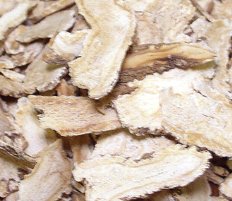Dang Gui

  | Dang Gui in TCM:Explore the properties of Dang Gui according to Chinese
Nutrition and Traditional Chinese Medicine (TCM):
Factoids:
English Name: tangkuei, angelica root, dong quai, Chinese
angelica
Pharmacuetical Name: Radicis Angelicae Sinensis
Properties: sweet, acrid, warm
Temperature: warm
Channels: SP, HT, LV
Flavors: sweet, pungent
Tonifies: blood
Special Properties:
circulates blood, clears damp, eliminates toxins, disperses wind, resolves dryness, reduces swelling, alleviates bi syndrome
Alternate Forms:
- Dang Gui Shen (body) - tonify blood
- Dang Gui Wei (tail) - invigorates blood
- Quan Dang Gui (whole) - harmonize blood, tonify and invigorate
Actions / Indications:
- Tonifies Blood (pallid complexion, tinnitus, blurred
vision, palpitations, Dang Gui is more tonifying than moving)
- Invigorates blood; regulates menses; alleviates pain
(irregular menstruation, amenorrhea, dysmenorrhea; pain due to blood
stasis: abdominal pain, traumatic injury, carbuncles, especially with
deficient cold; blood deficiency with chronic wind-damp-bi)
- Moistens the intestines and unblocks the bowels (dry
intestines due to blood and yang deficiency)
- Reduces swelling, expels pus, generates flesh, alleviates
pain (chronic sores, abcesses; also for early stage of toxic
swellings when combining with clear heat toxicity herbs)
Special Notes:
- One clinical study showed 90.2% effectiveness in treating 51 patients
with cough and wheeze. Most patients responded in 2-3 hours.
- For post-partum w/ early stage of common cold combine Dang
Gui with Huang Qi.
Contraindications:
- (cc: caution with dampness: diarrhea or abdominal distension)
- (cc: yin deficiency with heat)
Disclaimer: In accordance with our terms of service, by using this web site you agree that none of the information found on this web site constitutes medical advice. You should always consult your doctor before trying any particular food or herbal remedy to treat disease.
Folk remedies presented on this site are designed to address specifc TCM diagnoses, and are not one-size-fits-all. If you would like to learn more about Traditional Chinese Medicine (TCM) and how it relates to Chinese Nutrition, you can book in a free call with a licensed professional. There is no obligation to purchase.
[CLICK HERE for your free INITIAL CONSULTATION] |

